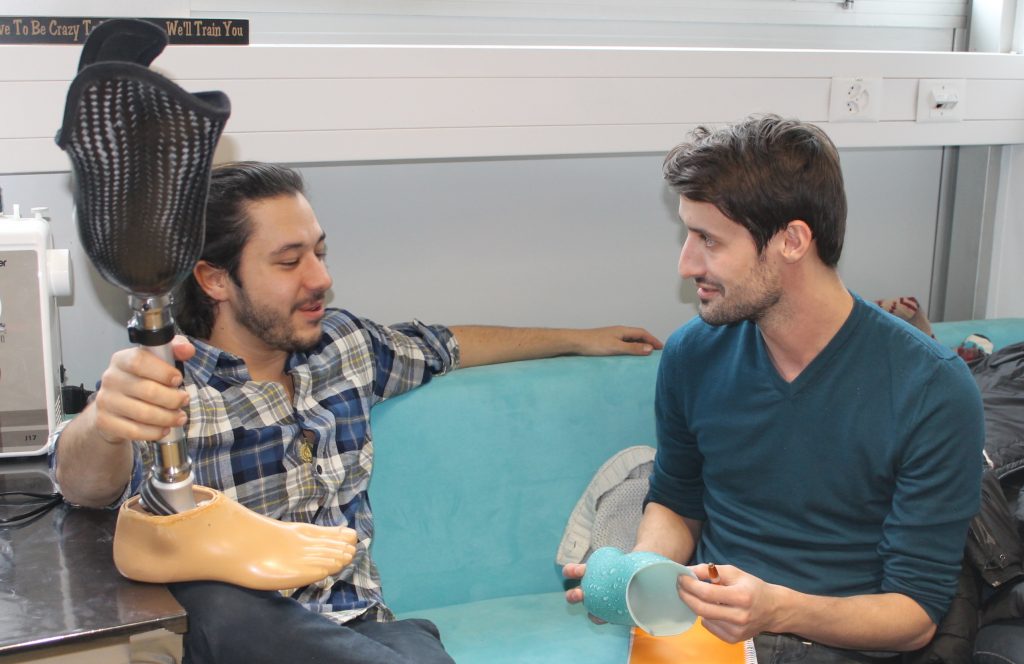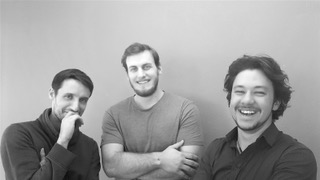Branch
Select your branch
Swiss Motion Technologies: An Affordable and Customized Mobility Solution for Amputees
Innovator of the Month Interview by Eleonora Borda and Ece Yıldız
Swiss Motion Technologies (formerly Nextep) is a Swiss start-up based in Lausanne, which develops innovative mobility solutions for amputees. Their tailored liners combine revolutionary manufacturing techniques including scanning the residual limb and implementing digital manufacturing methods to reduce cost and enhance comfort. Moreover, in view of today’s manual manufacturing methods to make customized socks, their production methods are automated and take much less time to produce. We interviewed Clément Gabry, a co-founder, as part of the Audience Prize awarded to Swiss Motion Technology at the Local Finals of our IMAGINE IF! Accelerator in Lausanne in October 2017.

IF Lausanne [IFL]: Can you briefly describe to us how Swiss Motion Technologies got here today?
Clément: The project was launched about a year and a half ago by Kevin Mamalis who initially won a 20000 CHF prize that lent credibility to the project. A few months later, Alexandre Grillon and I joined Kevin as the two other co-founders. The first biggest challenge we faced was to find the necessary resources to start a medtech project, which usually requires several hundred thousand francs. Luckily, through the participation in several Swiss competitions and the support of different organizations, we were able to acquire such funds to lay the foundations and start certifying our products. Recently, we hired two additional engineers to speed up the development of our business and put our products on the market as soon as possible.
IFL: You took part in the IMAGINE IF! Competition. How was this experience for you and how do you feel about being chosen as the best start-up by the audience?
Clément: I was positively surprised by the quality of the IMAGINE IF! projects. Overall, it was very good compared to some of the other competitions that we took part in. I believe this also reflects the quality of start-ups in Switzerland.
The Audience Award was proof for us that what we are doing speaks to people, and that we can attract their interest even if they are not directly involved in our field.
IFL: How important is to be part of an accelerator and incubator program during the initial phase of your start-up?
Clément: It really depends on your project and the phase you are at. If you are by yourself, it is crucial because it helps you to get the necessary support and to make you aware of your blind spots. It is also useful to discuss the ideas of others and get to know start-ups from different fields. Moreover, accelerators and incubators can be useful to find co-founders, gain skills and get ideas. For us it proved very useful at first. However, later, as you validate your idea, you need to get out in the real world and start building your business.
IFL: In which aspect does your solution distinguish Swiss Motion Technologies from what is already on the market?
Clément: We accelerate the manufacturing process by automating several production steps. Today, tailored socks are often handmade.
With our technology we can provide products with a similar, to slightly better quality, but we provide them faster and cheaper.
Prosthetic technicians just need to scan the limb and easily order the product. Thanks to that, they save a lot of time compared to doing it manually! To automate the process we have developed several new technologies, such as a novel 3D printing method. Overall, with all the advantages of replacing today’s manual production method, we hope to increase the number of amputees who can benefit from a tailored liner.

IFL: How difficult is it to go through the regulatory aspects for such medical product?
Clément: As our tailored liner is only in contact with the skin, less regulatory aspects have to be checked than, for example, a vaccine or an implantable device. Still, the certification process requires quite some time, especially when you are new in the field. Certification is therefore one of the most time consuming and expensive activities that we have had to focus on. Sometimes, in a start-up, regulatory requirements can be frustrating, as you wish less barriers would be present in order to go faster. In the end however, we all agree that it’s a necessary process, as it ensures a higher level of safety and guaranteed quality for the end users.
IFL: Where do you see Swiss Motion Technologies in 10 years?
Clément: When you build a start-up, it is hard to know what is going to happen, especially in a highly competitive field. For now, we are very grateful for all the support we have received, and we are enjoying the learning process and exciting growth prospects.
Our main vision is to push the project as far as possible and help many amputees to reduce the pain and discomfort they are used to enduring.
We’ll have a hundred possible directions to take, most probably towardsorthopedic applications, such as custom orthotics. Since the beginning, it has always been part of our vision to bring relief to patients in developing countries, where the conditions for people living with limb loss are very difficult. For that, the financial support of some major non-governmental organizations (NGOs) could allow us to bring our portable and versatile solution to those populations in need in developing countries, the number of amputees is much higher due to not only diabetes and accidents, but also untreated diseases, land mines and war. However, the absence of healthcare reimbursement in those countries may be challenging. Alternatively, we could also wait to have grown big enough to be able to fund this kind of project and dedicate our time and resources to these countries.
IFL: In your personal path, you first worked in a consulting company and then you co-founded Swiss Motion Technologies. Was becoming an entrepreneur just an opportunity or a dream?
Clément: After my studies I wanted to become an entrepreneur, but it seemed out of reach as I had neither a specific idea, nor industry experience or resources. Working in business development for a consulting company I got to know the business world and acquired experiences and skills. One year and a half later, when Kevin proposed that I join the team, I jumped on the opportunity. I realise now that I was actually building barriers in my mind when I graduated. Everything is in place here in Switzerland to support entrepreneurs that want to go for it, no matter if you have the resources or the experience.
IFL: What is THE piece of advice you would give to a wannabe-entrepreneur?
Clément: Tough question!
My advice is to go out there and talk to your customers. It is crucial to share your ideas in order to realize problems and set priorities.
Besides this, have partners with whom you can work. This was really important to get us here today: just two of us couldn’t have made it! Don’t isolate yourself and go find the people who have the skills you need and give you a different perspective!


